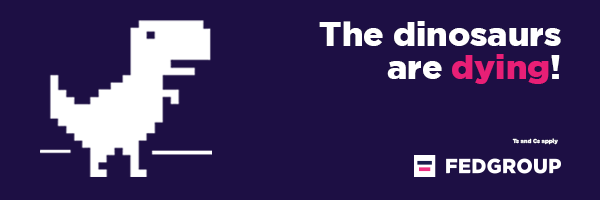The modern world is no place for a dinosaur. Sure, they gave us valuable information and insights, and because they’ve been around the block a few times, we’ve learned substantial lessons from them. They rose to prominence when the ecosystem needed them, but a bulky, lumbering entity doesn’t have what it takes to thrive in a fast-paced environment where what once worked, no longer does. And yet, the financial industry is full of them. Despite their rigid structures, slow response times, and bureaucratic decision-making processes, they’re still hanging in there. But how?
Well, people are innately more inclined to trust what is familiar, and because the dinosaurs have been around for so long, they’re coasting along on that inherited trust. They’re benefitting from the fact that nobody questions the mighty T-rex bearing all those teeth as a reminder of its status – despite its tiny arms.
However, just like the T-rex, the dinosaurs of the financial industry have some serious shortcomings. Ironically, these exist precisely because of how old they are. They’re often operating on systems that were built in what seems like the Late Cretaceous period and don’t allow for divisions of the business to easily talk to one another, making it difficult to service clients effectively. If you’ve ever had to ask to have your statements emailed rather than posted, you know what we’re talking about.
Their sights are stubbornly set on the past, and in this era where information is king and constantly evolving technology demands that we adapt or die, that tunnel vision will likely lead to another extinction-level event. They might be able to dodge the initial impact, but in the ensuing downward spiral their clients will inevitably be the first casualties. We’ve seen that it only takes one meteor – or more recently, one bat – to wipe out an entire investment portfolio. If the dominant entities don’t start exploring new ways to navigate their environment, what hope is there for those who rely on them?
Too many investment providers are simply operating as middlemen, repackaging the same tired assets and taking a fat fee, while providing little intrinsic value. With an entire industry buying into itself, there’s often limited incentive to create new opportunities. The dinosaurs seem to have lost sight of their primary purpose: creating value for their customers.
Over the last three decades, while the rest of the industry cruised on autopilot, we’ve taken a different approach.
Fedgroup has developed holistic solutions with our deep vertical integration and on-the-ground expertise, along with innovative use of multiple financial services licenses. Through effective origination and deployment of unique opportunities, along with strong due diligence and monitoring, we’ve delivered innovative products that benefit investors seeking a superior risk-adjusted return.
Being seen as a credible provider no longer hinges solely on tenure or reputation. It’s about the innovative and cohesive use of capabilities to create new solutions that adapt to a changing marketplace, addressing modern opportunities and needs.
It’s about fostering symbiotic partnerships that are markedly different to the industry norm of faceless transactions, and the results speak for themselves. Frustrated with the inflexible approach of traditional providers, CEO of Alleyroads property group, Ivan Pretorius, listed this as a key factor in securing a recent finance deal with Fedgroup, worth circa R1 billion.
Dinosaurs aren’t all bad, though. There are some gentle giants. But there is still the ever-present threat of the little guys getting crushed underfoot, whether intentionally or simply because the giants weren’t agile enough to pivot for the sake of those in their environment.
So, while they continue to lumber about contemplating their next move, we’ll be capitalising on the emerging opportunities in this new landscape, with our eyes firmly on the horizon and ensuring that our clients reap the rewards.
Keen to find out more about Fedgroup? Visit them at this link.




